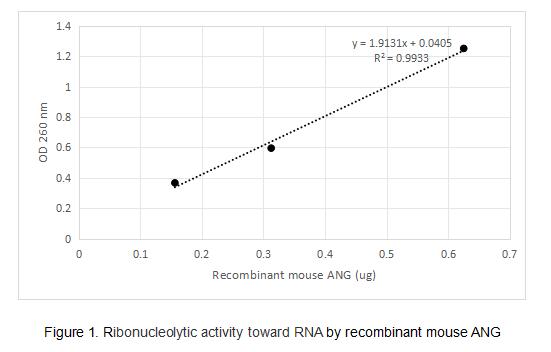Active Angiogenin (ANG)
RNASE5; Ribonuclease,RNase A Family 5
- Product No.UAPA007Mu02
- Organism SpeciesMus musculus (Mouse) Same name, Different species.
- Buffer FormulationPBS, pH7.4, containing 0.01% SKL, 5% Trehalose.
- TraitsFreeze-dried powder
- Purity> 90%
- Isoelectric Point9.8
- ApplicationsCell culture; Activity Assays.
- Download Instruction Manual
- UOM 10µg50µg 200µg 1mg 5mg
-
FOB
US$ 104
For more details, please contact local distributors!US$ 261
For more details, please contact local distributors! US$ 522
For more details, please contact local distributors! US$ 1566
For more details, please contact local distributors! US$ 3915
For more details, please contact local distributors!
ACTIVITY TEST of the Active Angiogenin (ANG)

Angiogenin (ANG) was initially purified from serum-free media conditioned by growth of a human adenocarcinoma cell line HT-29 based on its ability to initiate vascularization in the chicken embryo chorioallantoic membrane. A number of other tumor, as well as normal, cell lines can also secrete Angiogenin. In addition, Angiogenin is present in normal human plasma at levels as high as 60-120 ng/mL. Surprisingly, Angiogenin has been found to be a member of the ribonuclease superfamily with approximately 35% sequence similarity at the amino acid level with pancreatic RNase. Angiogenin exhibits ribonucleolytic activity that is distinctly different than that of pancreatic RNase A. The ribonucleolytic activity of Angiogenin toward most RNase A substrates is much lower than that of RNase A. Nevertheless, the ribonucleolytic activity of Angiogenin is essential to its angiogenic activity since inhibition of the Angiogenin RNase activity will also abolish angiogenesis activity. The activity of recombinant mouse ANG was measured by its ribonucleolytic activity toward RNA. The result was shown in figure 1, and the rmANG produces a delta Abs260/μg >1.0 in two hours.
USAGE of the Active Angiogenin (ANG)
Reconstitute in 10mM PBS (pH7.4) to a concentration of 0.1-1.0 mg/mL. Do not vortex.
STORAGE of the Active Angiogenin (ANG)
Avoid repeated freeze/thaw cycles. Store at 2-8°C for one month. Aliquot and store at -80°C for 12 months.
STABILITY of the Active Angiogenin (ANG)
The thermal stability is described by the loss rate. The loss rate was determined by accelerated thermal degradation test, that is, incubate the protein at 37°C for 48h, and no obvious degradation and precipitation were observed. The loss rate is less than 5% within the expiration date under appropriate storage condition.
INCREMENT SERVICES
BCA Protein Quantification Kit
Molecular Mass Marker for Protein
Monoclonal Antibody Customized Service
Polyclonal Antibody Customized Service
Protein Activity Test Experiment Service
Electrophoretic Mobility Shift Assay (EMSA) Experiment Service
Buffer
Lentivirus Packaging Experiment Service
Adenovirus Packaging Experiment Service
Real Time PCR Experimental Service
Spike RBD Protein (S-RBD)
Protein G
Protein A
Related products
| Catalog No. | Organism species: Mus musculus (Mouse) | Applications (RESEARCH USE ONLY!) |
| UAPA007Mu02 | Active Angiogenin (ANG) | Cell culture; Activity Assays. |
| URPA007Mu01 | Recombinant Angiogenin (ANG) | Positive Control; Immunogen; SDS-PAGE; WB. |
| URPA007Mu02 | Recombinant Angiogenin (ANG) | Positive Control; Immunogen; SDS-PAGE; WB. |
| UPAA007Mu01 | Polyclonal Antibody to Angiogenin (ANG) | IHC |
| UPAA007Mu02 | Polyclonal Antibody to Angiogenin (ANG) | IHC |
| USEA007Mu | ELISA Kit for Angiogenin (ANG) | Enzyme-linked immunosorbent assay for Antigen Detection. |
| ULMA007Mu | Multiplex Assay Kit for Angiogenin (ANG) ,etc. by FLIA (Flow Luminescence Immunoassay) | FLIA Kit for Antigen Detection. |



